|
壹、前言
我們為什麼要提出「心靈改革」這個主題?讓我們先從一則故事說起:
有一次,世尊在寂靜的森林中坐禪,聽到遠處兩個青年男女的歡笑聲,沒多久,那年輕女孩逃入森林中,卻不知道世尊坐在那兒,又經過一會兒,那年輕男孩也行色匆匆地追趕過來,見到世尊,急忙問道:「剛才有沒有一個女孩跑過來?她偷走了我的錢包。」世尊不動聲色地反問:「尋找逃跑的女孩和尋找自己,哪個重要?」年輕男孩對這突如其來的問題,感到茫然,世尊再一次問他:「尋找逃跑的女孩和尋找自己,哪個重要?」年輕人在心中,反覆著世尊的問話,終於恍然大悟。
各位大德,那年輕人悟到什麼呢?那就是人們「迷己逐物」,迷失了自己,一味追求金錢、物質和名譽。我們為什麼會迷失自己呢?事實上我們成長的過程,就是我們迷失的過程。這話怎麼講?我們原本的心,自一出生就被六塵不斷地覆蓋,形成了我們現在的表面意識─分別心;那沒有分別的、永恆不變的真心被埋沒了。隨著我們的成長,也加深了對外在事物的認同。每個人都用自己的經驗、習慣與定義來看待事情,看到美好的事物,我們歡喜;看到不順眼的東西,我們厭惡;環境調和的時候,我們高興;到了環境低潮產生一種壓抑感的時候,我們就會憤怒,或者就會悲觀,乃至沮喪。
我們認假作真,把無常當永恆,把虛幻當真實,把每件事、物看為實有。我們的心不斷向外攀緣,在貪、瞋、癡中打轉。
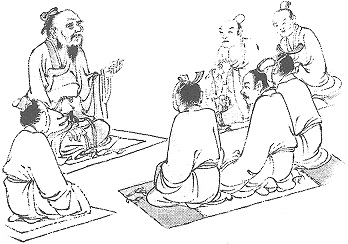 二十一世紀號稱是資訊科技爆炸的時代,科學發展加重人們對物質的依靠,人心卻更為空虛,更為迷茫;如何平衡科技造成的人格唯物化,這是新世紀人類共同面臨的最大問題。 二十一世紀號稱是資訊科技爆炸的時代,科學發展加重人們對物質的依靠,人心卻更為空虛,更為迷茫;如何平衡科技造成的人格唯物化,這是新世紀人類共同面臨的最大問題。
唯有改變心態,從「心靈改革」做起,找回迷失的自己,自覺、覺他、覺滿,才能邁向生命的圓滿。
貳、自覺
一、道德的自覺
儒家思想以道德為依歸,孔子說:「志於道,據於德,依於仁,遊於藝。」(述而篇)孔子的中心思想在「仁」,孔子一生做的,就是實踐仁的工夫;孔子的生命,就是實踐仁的生命。仁是一切德性所從出,仁代表真實的生命。孔子的「仁」,具有下列兩大特質:
(一)覺。不是感官知覺或感覺,而是孟子所謂的惻隱之心或不忍人之心。孔子從哪個地方指點仁呢?就從「人心安不安」這個地方來指點仁。孔子的學生宰我說:「三年喪太久了,改為一年行不行呢?」孔子就問他:「你父母過世一年後,就吃稻米,穿錦衣,心上安不安呢?」宰我說:「安。」孔子就說他不仁。宰我說「安」就是不仁,那麼如果是「不安」,仁不就顯出來了嗎?這就是「自覺」,更明白地說,就是「道德的自覺」。能夠自覺,才不至於麻木;中國成語「麻木不仁」便指出了仁的特性是有覺,而不是麻木。一個人可能在錢財貨利方面有強烈的知覺或感覺,但他仍可能是麻木不仁的,儘管他有多麼厲害的聰明才智。那是因為「覺」是指道德心靈的。仁是理、是道、也是心。孔子從「心安不安」來指點仁,就是要喚起人們道德心靈的覺醒;因此仁就不只是理、道,仁也是心。
(二)健─是「健行不息」。〈易經〉說:「天行健,君子以自強不息」。君子看到天地的健行不息,覺悟到自己也要效法天道的健行不息。這表示我們的生命,應通過「覺」以表現「健」;或者說,要像天一樣,表現創造性,呈現生命的活力。「健」字的含義,當然不是體育方面健美的健,而是純粹精神上的創生不已。子貢問於孔子曰:「夫子聖矣乎?」孔子曰:「聖則吾不能,我學不厭而教不倦也。」子貢曰:「學不厭,智也;教不倦,仁也。仁且智,夫子既聖矣。」
〈孟子公孫丑上〉學不厭而教不倦,正是「健行不息」的體現。
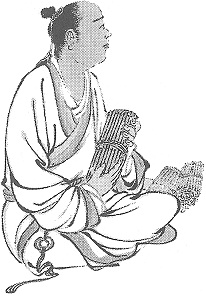 孔子實踐仁的工夫,是「克己復禮」和「下學而上達」。「克己復禮」的行動綱領是「非禮勿視,非禮勿聽,非禮勿言,非禮勿動」。所謂「下學」的「學」,就是孔子所說的「學而時習之」的「學」。雖然這種「學」,與追求專門知識的「學」,都是從累積經驗做起,但是它們有本質上的差別:追求專門知識的「學」,是以成專家為目的,並無德性修養的意味;「下學而上達」的「學」,當然亦須從日常生活的實踐經驗著手,可是它以上達天德為終極目標。換句話說,它的作用是把知識消化於生命,轉化為生命所具有的德性。「下學」的材料極為廣泛,只是在學習期間,沒有成為某方面專家的企圖,心中念念不忘的,便是怎樣轉化經驗知識為內在的德性;簡單地說,就是怎樣「轉智為德」。然而,這轉化不是容易得來的,它必須通過內心的覺悟;因此古人解釋「學」為「覺」,極有意義。「覺」等於德性的開啟或悟發,當然不是憑空地開啟,而是從經驗知識的獲得開始。 孔子實踐仁的工夫,是「克己復禮」和「下學而上達」。「克己復禮」的行動綱領是「非禮勿視,非禮勿聽,非禮勿言,非禮勿動」。所謂「下學」的「學」,就是孔子所說的「學而時習之」的「學」。雖然這種「學」,與追求專門知識的「學」,都是從累積經驗做起,但是它們有本質上的差別:追求專門知識的「學」,是以成專家為目的,並無德性修養的意味;「下學而上達」的「學」,當然亦須從日常生活的實踐經驗著手,可是它以上達天德為終極目標。換句話說,它的作用是把知識消化於生命,轉化為生命所具有的德性。「下學」的材料極為廣泛,只是在學習期間,沒有成為某方面專家的企圖,心中念念不忘的,便是怎樣轉化經驗知識為內在的德性;簡單地說,就是怎樣「轉智為德」。然而,這轉化不是容易得來的,它必須通過內心的覺悟;因此古人解釋「學」為「覺」,極有意義。「覺」等於德性的開啟或悟發,當然不是憑空地開啟,而是從經驗知識的獲得開始。
孔子認為從「下學」可以「上達」,那就是說:只須努力實踐仁,人便可遙契天道,也就是使自己的生命與天的生命打成一片,所以孔子作出「知我者其天乎」的感嘆。孔子行年五十,由於不斷實踐仁,生命更精純了,思想更精微了,因此他說「五十而知天命」。
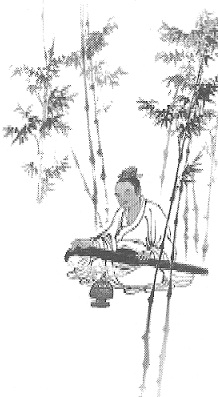 孟子繼承孔子思想,而講道的心性,論人皆有四端之心──惻隱之心,仁之端也;羞惡之心,義之端也;辭讓之心,禮之端也;是非之心,智之端也。「四端之心」是道德心,是根據孔子的「仁」而轉出的。孔子要人做仁者,以實踐仁為工夫。 孟子繼承孔子思想,而講道的心性,論人皆有四端之心──惻隱之心,仁之端也;羞惡之心,義之端也;辭讓之心,禮之端也;是非之心,智之端也。「四端之心」是道德心,是根據孔子的「仁」而轉出的。孔子要人做仁者,以實踐仁為工夫。
孟子講擴充四端之心,盡心知性,養浩然之氣,也是工夫。〈大學〉講明明德、講格物、致知、誠意、正心、修身,都是道德實踐的工夫。〈中庸〉講慎獨、致中和,自喜怒哀樂處談致中和,這都是工夫。講五達道、三達德,都不能違離誠,而誠就是工夫。所謂「誠者自誠,不誠無物」,誠是關鍵之所在,也是工夫之所在。
近代有一些人不喜歡講道德,一聽到道德,就好像孫悟空聽見金箍咒一樣,渾身不自在;這些人總以為道德是來束縛人的,所以就討厭道德,曲解儒家思想。其實道德並不是來拘束人的,道德是來開放人、來成全人的。
透過道德的自覺,使人心胸更開闊,從私人的習氣、慾望之中解放出來,才能清澈生命的渣滓,從根本消化生命中非理性、反理性的成分,才能真正開出生命之源、價值之源、理想之源。
待續
|
|
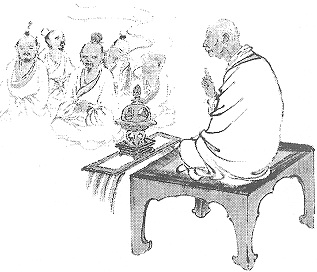 Foreword Foreword
Why are we raising the topic of reforming the mind and spirit? Let us first start with a story:
One day, the World Honored One was meditating in a peaceful forest when he heard the laughter of a young man and woman from afar. Soon after, the young woman ran into the forest, not knowing that the World Honored One was meditating there. A while later, the young man followed in quick pursuit and upon seeing the World Honored One, asked him hastily, “Was there a young woman who went by this way just now? She stole my wallet.”
The World Honored One replied calmly, “What is more important, to find a woman who has run away or to find oneself?” The young man was taken aback by this unexpected question. The World Honored One asked him again,
“What is more important, to find a woman who has run away or to find oneself?” The young man pondered the question and suddenly attained a great awakening.
All Greatly Virtuous Ones, what has the young man awakened to? He has awakened to the fact that people lose themselves in the pursuit of objects, blindly chasing after money, material things, and fame. Why have we lost ourselves?
The process of growing up is in fact the process of losing ourselves. What does this sentence mean? Our original mind has been covered over unceasingly by the six sense objects from the time we were born, resulting in the superficial mind-consciousness that we have now—the distinction-making mind. The everlasting, unchanging true mind that is without any discriminations has been covered over. As we grow to maturity, we have deepened our understanding of external objects and phenomena; every person uses his or her experiences, habits, and definitions to view and deal with issues. When we see beautiful things we give rise to liking, and we dislike things we are averse to. In agreeable situations we are happy, and when we feel oppressed by disagreeable situations, we become angry, pessimistic, or depressed.
We mistake the false for the true, the impermanent for the everlasting, and the illusory for the real. We falsely take every object and experience to have actual existence. Our minds constantly seek to exploit external conditions, and we spin around in the midst of our greed, anger, and delusion.
The twenty-first century is called the information and technology explosion age. Scientific advances have increased man’s reliance on material objects, but people’s minds have become more and more spiritually hollow, obscured, and deluded. The greatest challenge that mankind faces in this new century is how to quell the obsession with materialism that technology has fostered. Only by changing our attitude by reforming our mind and spirit, rediscovering our lost self, awakening ourselves, and awakening others can we forge ahead towards a fulfilling life.
Awakening Oneself to Moral Virtue
Confucianism is founded upon moral virtue. Confucius said, “Set your will on the Way, firmly adhere to virtue, accord with benevolence, and amuse oneself with the polite arts.”(Shu Er Chapter) The core virtue of Confucian thought is benevolence. Confucius devoted his life to practicing benevolence. Confucius’ life was one of actualizing benevolence. Benevolence is the source from which virtue springs forth; benevolence represents true living. There are two great aspects of the benevolence advocated by Confucius, which are as follows:
1) Awareness – this refers neither to physical touch nor emotional feelings but rather to what Mencius called “the mind of compassion” or “the unwillingness to stand by while others suffer.”
What constitutes benevolence from Confucius’ standpoint? He explains that one must first determine whether or not one’s mind is at ease. One day, Zai Wo, a disciple of Confucius, said that the three-year period for mourning over one’s deceased parents was too long; could it be shortened to one year?
Confucius asked him, “A year after your parent’s death, is your mind at ease when you eat rice and wear brocade?”
Zai Wo replied, “Yes.”
Confucius said that he was not being benevolent. If Zai Wo’s being at ease meant that he was not benevolent, then wouldn’t the mind which is not at ease then be an expression of benevolence?
This is the awakening of one’s conscience; it shows clearly how the self can be awakened to moral virtue. One who has awakened oneself will not be apathetic or insensitive. The Chinese saying: “To be apathetic is to be without benevolence” points to the fact that the specific nature of benevolence is to be aware, not apathetic. A person may have a keen sense of profit in terms of money and material objects, but he can still be apathetic and not benevolent despite his vast capabilities, knowledge, and intelligence. This is because “awareness” refers to the moral virtue of the mind and spirit. Benevolence is a principle; it is the Way and it is also a state of mind. The question of whether or not the mind is at ease is used by Confucius to delineate benevolence in order to awaken people to the moral virtue of the mind and spirit. Hence, benevolence is not just a principle or the Way, it is also a state of mind.
2) Invigoration – this is to practice invigoration unceasingly. The I-Ching says, “Heaven practices invigoration, the noble man seeks to improve himself unceasingly.” The noble man, seeing that heaven and earth constantly revitalize themselves, awakens to the truth that one should follow the example of Heaven and ceaselessly improve oneself. We should, through the practice of awareness, “invigorate” our lives. That is to say, we should model ourselves after Heaven and bring forth our creativity and vitality.
The meaning of the word “invigoration” clearly does not refer to physical bodybuilding, but instead expresses the ability to always be creative.
Zi Gong once asked Confucius, “Master, are you a sage?”
Confucius replied, “I am not a sage. I am merely never weary of learning or teaching.”
Zi Gong then said, “Not growing weary of learning is wisdom and not getting tired of teaching is benevolence. Being both wise and benevolent, Master, you are definitely a sage.”
In The Book of Mencius, Gong Sun Chou Chapter (Volume 1), it says that not getting weary of learning and teaching is the embodiment of “to practice invigoration unceasingly.”
In Confucius’ conception of benevolence, a person should “restrain oneself to accord with propriety” and “learn from those below in order to reach what is above.” The guiding principle for behavior in “restraining oneself to accord with propriety” is to “see nothing improper, listen to nothing improper, speak and do nothing improper.”
“Learning from those below” is what Confucius refers to as “learning and constantly putting into practice.” Although this kind of learning and the learning of specialized knowledge both begin with the accumulation of experience, there are intrinsic differences between the two. Pursuing specialized knowledge is for the purpose of becoming a specialist in a given field, without any particular stress on the cultivation of virtue. “Learning from those below in order to reach what is above” certainly requires one to learn from actual experiences from daily life, but ultimately one’s goal is to attain the virtue of Heaven. In other words, the function of learning is to apply the knowledge gained to one’s life, to transform it into virtue in one’s life.
The material for “learning from below” is extremely vast and extensive, but throughout the process of learning, there is not the motive to become a specialist in a certain area. What is constantly in one’s mind is how to transform knowledge and experience into an inner virtuous nature. To put it simply, it is how to transform knowledge into virtue. This transformation is not easy to achieve, for it must be realized by an awakening of the innermost mind. In ancient times, people explained “learning” as “awareness.” Such an explanation has great significance. Awareness is equivalent to the opening up of or the awakening to the nature of virtue. It definitely is not a baseless awakening but one that begins with the attainment of knowledge and experience.
In Confucius’ opinion, by learning from below one could reach what is above. That is to say, one need only diligently practice benevolence, and one will be able to unite with the way of Heaven; one’s life will merge with that of Heaven. Hence, Confucius once sighed and said, “Only Heaven understands me.” When Confucius was fifty, his life became more refined because of his unceasing practice of benevolence, and his thoughts were loftier and more subtle than before. Hence he said, “At fifty, I understood the inner calling from Heaven.”
Mencius inherited Confucius’ legacy and expounded upon the mind and nature of virtue. He maintained that every person has “four initial states of mind.” He said: “The feeling of commiseration is the beginning of benevolence. The sense of shame is the beginning of righteousness. The willingness to concede to others is the beginning of propriety. The ability to distinguish right from wrong is the beginning of knowledge.” These four beginning states of mind, which constitute the mind of moral virtue,are derived from Confucius’ philosophy of benevolence. Confucius hoped that all people would be benevolent—that they would practice benevolence.
Mencius talks about expanding the four initial states of mind in order to understand the mind and nature, and nourish a vast, flowing energy. These all require skills. The
Great Learning discusses radiating bright virtue, exhaustively examining the the principle of things and affairs, extending one’s knowledge, being sincere, making the mind upright, and cultivating oneself. These are all skills for actualizing moral virtue. The
Doctrine of the Mean relates the practice of being cautious even in solitude and of achieving harmony and equanimity, and also discusses how to achieve harmony and equanimity through tempering the emotions of happiness, anger, sorrow, and joy. These are also skills. The
Doctrine of the Mean also elucidates the five paths and the three virtue, all of which involve the virtue of sincerity. Sincerity is just a basic skill to be attained. As the saying goes, “The sincere person is naturally sincere; to be insincere is to not exist.” Thus, sincerity is a crucial issue and is where the skill lies.
Some people in recent times do not like to talk about moral virtue. The very mention of moral virtue is as distasteful and discomforting as Monkey King (Sun Wukong) hearing mention of the band-tightening spell.
These people think morality constrains people, so they abhor it and deliberately misinterpret the Confucian school of thought. In fact, moral virtue does not constrain people; it liberates them and makes them wholesome. By awakening to moral virtue, people become more magnanimous—they are freed from their bad habits and desires. They can expunge and eradicate the impure, irrational, and illogical aspects of their lives, and open up to the source of life, values, and ideals.
To be continued
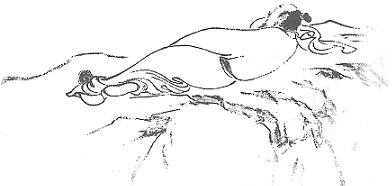
|